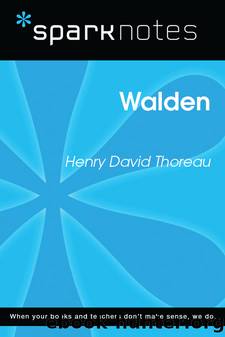Walden: SparkNotes Literature Guide by SparkNotes

Author:SparkNotes [Sparknotes Editors]
Language: eng
Format: epub
Tags: Study Guides
ISBN: 9781411478237
Publisher: Spark
Published: 2014-09-10T00:00:00+00:00
The Bean-Field
Summary
Thoreau plants two and a half acres of beans, along with smaller amounts of potatoes, turnips, and peas, and farms them throughout the summer months. Working barefoot, he lays out his plot, pausing at times to observe the wildlife around him. He hoes his beans each day and settles into the daily routine of the farm worker. The rains that come help his crops, but the woodchucks destroy a significant portion of them. Thoreau, anticipating that the soil of his bean plot will be rich, discovers that âan extinct nation had anciently dwelt here and planted corn and beans ere white men came to clear the land, and so, to some extent, had exhausted the soil for this very crop.â Thoreau finds evidence of this previous occupation everywhere, excavating arrowheads, shards of pottery, and other artifacts among the âashes of unchronicled nationsâ while digging.
Thoreau often leans on his hoe and enjoys the âinexhaustible entertainmentâ of his environment, the sights and sounds of nature. But he also hears military exercises echoing from the nearby town, resounding across the bean-field. Thoreau says he finds himself reassured on such days, confident that his liberties would be defended in the event of a conflict. Thoreau says that, on hearing the gunfire, âI felt as if I could spit a Mexican with a good relish ⦠and looked around for a woodchuck or a skunk to exercise my chivalry upon.â In his rural enclave, however, he feels distant from the necessity of war.
In all, Thoreau spends just under fifteen dollars on his crops, earning almost twenty-four dollars and making a profit of almost nine dollars. No great eater of beans himself, he barters most of his crop for rice, keeping the turnips and peas for his own sustenance. In providing advice on husbandry, Thoreau recommends fresh soil, vigilance against pests, and an early harvest that beats the first frost. But despite the profit he makes, Thoreau states that his purpose in cultivating crops is not so much to earn money but to develop self-discipline. He says that it is the cultivation of the farmer, and not the crop, that makes husbandry a worthwhile pursuit. Thoreau marvels that people care so intently about the success of their farms and so little about the state of the âcropâ of men.
Thoreau reflects that nature does not care whether the yearâs crop succeeds or fails, as the sun shines on plowed and fallow ground alike. Thoreau maintains that part of any crop is meant as a sacrifice to the woodchuck. Although the field infested with weeds is a curse to the hungry farmer, Thoreau says it is a blessing to the hungry bird. In such a world, Thoreau concludes, the farmer should not feel anxious, but should simply accept the blessings that nature bestows upon him.
Download
This site does not store any files on its server. We only index and link to content provided by other sites. Please contact the content providers to delete copyright contents if any and email us, we'll remove relevant links or contents immediately.
| African American | Asian American |
| Classics | Anthologies |
| Drama | Hispanic |
| Humor | Native American |
| Poetry | Southern |
Crazy Rich Asians by Kevin Kwan(9261)
How to Bang a Billionaire by Alexis Hall(8126)
Giovanni's Room by James Baldwin(7297)
Little Fires Everywhere by Celeste Ng(7167)
Win Bigly by Scott Adams(7166)
Pachinko by Min Jin Lee(5665)
Tease (Temptation Series Book 4) by Ella Frank(5620)
The Fire Next Time by James Baldwin(5409)
The Perks of Being a Wallflower by Stephen Chbosky(4624)
China Rich Girlfriend by Kwan Kevin(4545)
Bluets by Maggie Nelson(4534)
First Position by Melissa Brayden(4509)
The Sympathizer by Viet Thanh Nguyen(4370)
Rich People Problems by Kevin Kwan(4273)
A Little Life (2015) by Hanya Yanagihara(4259)
Right Here, Right Now by Georgia Beers(4183)
Walking by Henry David Thoreau(3937)
Catherine Anderson - Comanche 03 by Indigo Blue(3610)
The Death of the Heart by Elizabeth Bowen(3594)
